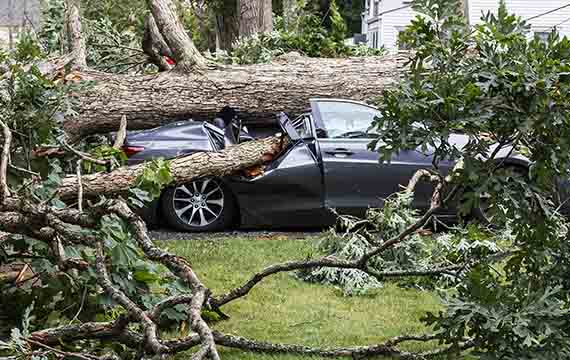SCC News

Financial
OCT 17, 2023
RICHMOND – The autumn season brings shorter days and falling leaves. It also brings an increase in vehicle collisions with deer.
An increase in vehicle-deer crashes during the fall is attributed to deer mating and migration that typically takes place this time of year. In fact, next month (November) is the peak month for insurance claims related to vehicle collisions with deer. The State Corporation Commission’s (SCC’s) Bureau of Insurance offers Virginia drivers a reminder to remain alert for deer when driving on roadways.
“A deer in the roadway poses a threat to even the most careful driver,” said Virginia Insurance Commissioner Scott White. “As fall arrives, contact your insurance agent or company to find out if your automobile policy provides coverage for claims involving a crash with deer or other wildlife.”
Insurance policies with liability-only coverage may not cover damage to your auto from a deer crash. Vehicle collisions with deer typically fall under an optional coverage called “other-than-collision” (or “comprehensive”) coverage. In addition to deer crashes, other-than-collision coverage often covers other types of damage to your vehicle, such as damage resulting from theft, wind, hail, flood, fire or vandalism.
Lowering your travel speed and staying distraction-free may help you avoid a crash with deer. If a deer runs out in the road, drivers should stay in their lane and brake as carefully as possible. While startling, striking a deer is often safer for the driver and vehicle occupants than swerving sharply and putting surrounding vehicles and their occupants at risk.
If a collision with a deer happens while on the road, notify law enforcement and your insurance company as soon as possible. When safe to do so, take photos of the scene of the crash, as well as damage to the vehicle if you plan to file an insurance claim. If you see leaking fluid, tire damage, broken lights or other damage, call a tow truck.
The Bureau of Insurance is here to assist Virginians with their questions regarding auto and many other types of insurance. For more information, call the Bureau toll-free at 1-877-310-6560 or in Richmond at 804-371-9741 or visit its website at scc.virginia.gov/pages/Insurance.
###
Contact: Jordan Bondurant, 804-371-9141

Financial
OCT 17, 2023
RICHMOND – The State Corporation Commission’s (SCC) Bureau of Financial Institutions (Bureau) is among money transmission regulators from 42 states, the District of Columbia and Puerto Rico to approve a settlement with licensed money transmitter ACI Payments Inc. and its parent company, ACI Worldwide Corp. (collectively, “ACI”) over roughly $2.3 billion in improperly processed and unauthorized electronic mortgage payments for more than 478,000 customers in April 2021.
Under the terms of the recent multistate settlement, each participating state will receive an equal portion of the more than $9.5 million civil penalty, or approximately $216,000 each. In addition, Nebraska-based ACI was ordered to pay $490,000 to reimburse 10 states for administrative costs related to the investigation. As part of the settlement and among other things, ACI also has agreed to implement changes to improve privacy and data security as well as introduce other safeguards to help protect consumers.
A copy of the SCC order regarding the settlement is available online via the SCC’s case information page at scc.virginia.gov/DocketSearch#/caseDetails/144515.
###
Contact: Katha Treanor,804-371-9141
Case Number BFI-2023-00126

Financial
SEP 27, 2023
RICHMOND – From fast food and fitness to real estate, home improvement and auto repair, franchises offer something for almost any business interest. Buying and operating a franchise business can require a substantial commitment of time and money. For this reason, the State Corporation Commission’s (SCC) Division of Securities and Retail Franchising (Division) encourages Virginians who are considering buying a franchise to educate themselves before they buy.
“Assess your financial resources, abilities and goals and thoroughly understand franchise disclosures and your rights,” said Division Director Doug Joyce.
A franchisor must provide each prospective franchisee with a detailed Franchise Disclosure Document (FDD) at least 14 days before they invest in that franchise business. Required by federal and Virginia laws, the FDD consists of 23 specific items of information, including: the history of the franchise being offered; information about its officers and directors; costs to the franchisee; obligations of the franchisor and franchisee; financial statements; restrictions; franchisor operating practices, and renewal, termination or transfer of a franchise. Joyce encourages prospective franchisees to read the FDD thoroughly and make sure they fully understand it before they buy a franchise business.
Franchisors are required to register franchises operated in Virginia with the Division before offering or selling them to the public. Alternatively, some franchises may qualify for an exemption from registration. To find out if a franchise is registered in Virginia, contact the Division at 804-371-9051 in Richmond or toll-free at 1-800-552-7945 or visit its website at scc.virginia.gov/RegSearches#FRANCHISE.
Additional franchising resources are available on the North American Securities Administrators Association (NASAA) website at nasaa.org/industry-resources/franchise-resources/.
###
Contact:

Financial
SEP 21, 2023
RICHMOND – The federal government has approved Virginia’s application to change the essential health benefits (EHB) benchmark plan for Affordable Care Act (ACA) health plans offered in the Commonwealth in the individual and small-group markets beginning January 1, 2025. The EHB benchmark plan sets the required benefits that must be provided by comprehensive fully insured individual and small-group health insurance coverage issued in Virginia. This is the first time changes have been made to Virginia’s EHB benchmark plan since 2017.
The Centers for Medicare and Medicaid Services (CMS), the federal agency primarily responsible for ACA oversight, approved Virginia’s application in late August.
The State Corporation Commission’s (SCC) Bureau of Insurance (Bureau) submitted the application pursuant to legislation passed by the 2023 Virginia General Assembly directing the Bureau to select a new EHB benchmark plan for plan year 2025.
In addition to the legislation regarding the 2025 EHB benchmark plan, the 2023 General Assembly passed legislation that establishes a new formalized process for future review and updates to Virginia’s EHB benchmark plan.
“We are pleased to announce CMS’s approval of these benefits for the 2025 EHB benchmark plan as specified by the Virginia General Assembly,” said Virginia Insurance Commissioner Scott A. White. “We look forward to our continuing future review of potential health benefit options to present to legislators for possible inclusion in the EHB benchmark plan for individuals and small groups who purchase fully insured health coverage in Virginia.”
Among the changes that have been made to Virginia’s EHB benchmark plan for qualifying health plans that begin January 1, 2025, are the following:
- Coverage for enhanced prosthetic devices and components – the new EHB benchmark plan redefines medically necessary prosthetics to include myoelectric, biomechanical or microprocessor-controlled prosthetic devices; and
- Formula and enteral nutrition products for inherited metabolic disorders as medicine – the new EHB benchmark plan requires coverage of orally administered, medically necessary formula and removes the requirement that medically necessary medical formula provide more than 51% of caloric needs.
Benefit changes to Virginia’s EHB benchmark plans do not apply to grandfathered plans or large-group plans, such as plans offered through large employers (51 or more employees).
A state’s EHB benchmark plan must include coverage for the following:
- Ambulatory patient services
- Emergency services
- Hospitalization
- Maternity and newborn care
- Mental health and substance use disorder services
- Prescription drugs
- Rehabilitative and habilitative services and devices
- Laboratory services
- Preventive and wellness services and chronic disease management
- Pediatric services, including oral and vision care
For questions or to learn more about Virginia’s 2025 EHB benchmark plan, contact the Bureau of Insurance by telephone at 804-371-9741 in Richmond or toll-free at 1-877-310-6560, by email at BureauofInsurance@scc.virginia.gov, or visit its website at Virginia SCC - Essential Health Benefits Benchmark Plan.
###
Contact: Katha Treanor, 804-371-9141

Financial
SEP 12, 2023
RICHMOND – Hurricanes and other natural disasters can take a huge toll on businesses, including closures or disruptions that may last for days or longer. Some businesses may never reopen following a natural disaster and others that reopen may fail within one year of the disaster due to its effects.
No business is immune to natural disasters. Even disasters far away can impact your business by disrupting supply chains and communications. Small businesses are particularly vulnerable when it comes to disasters since they often have fewer resources, locations and employees to help them become operational again.
The State Corporation Commission’s (SCC) Bureau of Insurance (Bureau) encourages businesses to review their insurance coverage regularly and adjust it, as needed, while considering the possibility of a natural disaster. Businesses should understand what their policies cover and how much they may need to make repairs, minimize disruptions, and pay business expenses – including payroll and payments to creditors – in the event of a disaster.
The Bureau reminds Virginians that advance planning is critical. “How you plan for and respond to disasters can determine whether your business survives,” said Virginia Insurance Commissioner Scott A. White. “Protect yourself and your business financially by preparing for the unexpected and having the insurance coverage you need when you need it.”
The Bureau offers the following tips to help get your business running again as quickly as possible after a natural disaster:
- Assess your risk for certain types of disasters, such as fires or floods.
- Have emergency disaster and business continuity plans in place.
- Make sure your insurance coverage is up to-date by reviewing policies and making adjustments, as needed.
- Know how to respond if disaster strikes.
Educate yourself on what your insurance policies cover and consider the following:
- What are your deductibles, coverage limits and exclusions?
- Do you need additional or separate coverages such as coverage for damage related to floods or earthquakes, which are not usually covered by standard business insurance policies?
- Do you need separate automobile insurance for business vehicles?
- Are your business and its contents insured for current replacement cost?
- Will you need business interruption insurance to cover loss of income that your business may suffer after a disaster?
Additional steps businesses can take include the following:
- Share business continuity plans with employees that include current employee contact information, backup vendors or suppliers and a temporary relocation site.
- Develop a communication plan and procedures for work processes and payroll during a disaster or business interruption.
- Keep preparedness items onsite at your workplace – including disaster provisions, maps with evacuation routes and access to a working radio and mobile apps for emergency instructions.
- Compile and safely store an inventory of assets and equipment (including computer hardware), and back up all personal and company data regularly in case information is lost during a disaster.
- Keep physical copies of important records (such as building plans, insurance policies, bank accounts and employee contact information) in a safe, waterproof and fireproof place.
- After a disaster strikes your business, contact your insurance agent or company immediately and ask what information is needed to file a claim.
The Bureau of Insurance offers free consumer guides specifically geared to businesses. To learn more, contact the Consumer Services Section of the Bureau of Insurance Property and Casualty Division toll-free at 1-877-310-6560 or in Richmond at 804-371-9185 or visit scc.virginia.gov/pages/Insurance.
For additional emergency preparedness information relating to disasters, visit vaemergency.gov.
###
Contact: Katha Treanor, 804-371-9141

Financial
SEP 01, 2023
RICHMOND – Many Virginians would face financial hardship if a wage earner in their immediate family died unexpectedly. Life insurance is designed to protect loved ones against the loss of an individual’s income or services. During Life Insurance Awareness Month (September), the State Corporation Commission’s (SCC) Bureau of Insurance (Bureau) reminds Virginians that there are many factors to consider when determining if life insurance is right for you and your family.
“When planning for your family’s financial future, review your existing resources, debts and other liabilities, as well as your family’s needs and goals,” said Virginia Insurance Commissioner Scott White. “Understand the different types of life insurance and shop around to compare prices and coverage.”
White encourages Virginians who already have life insurance to review their policies and beneficiaries regularly to ensure their coverage keeps pace with their changing circumstances. Life events such as a birth, divorce, remarriage or other changes affecting your finances (such as a new mortgage or a new job) may trigger a need to update your life insurance policy.
If you do not have life insurance, shop around and understand the different types of policies available and the costs. When determining how much coverage you may need, evaluate your existing resources and your family’s likely financial situation following a death. Consider the following: Does your spouse work? Do you have any sources of income other than salary? Do you have life insurance through your job?
Also think about financial obligations that may fall upon family members if you die, such as mortgage or rent payments, business expenses, medical expenses, car loans or student loans. Also consider your family’s short-term and long-term goals such as your spouse’s retirement, providing care for a loved one, or your children’s education.
Understand the difference between term life and permanent life insurance and how benefits are paid if you die. What you pay for life insurance (premiums) depends largely on the type of policy chosen, your health status, age, gender, occupation, family health history and lifestyle. Be sure to compare premiums, coverage and claims service when considering life insurance options.
Contact the Bureau in Richmond at 804-371-9741 or toll-free at 1-877-310-6560 for questions, or to make sure the company or individual offering the coverage is licensed and in good standing. The Bureau offers a free Virginia Life Insurance Consumer Guide with answers to many questions about life insurance. Consumer resources on a variety of insurance topics are available at scc.virginia.gov/pages/Tips,-Guides-Publications.
Additionally, the National Association of Insurance Commissioners offers a free Life Insurance Policy Locator Service that can help consumers find lost life insurance policies and annuity contracts insuring deceased individuals.
###
Contact: Katha Treanor, 804-371-9141

Financial
AUG 29, 2023
RICHMOND – There have already been nine named storms during the 2023 Atlantic hurricane season, three of which have developed into hurricanes and one into a major hurricane. As Hurricane Idalia makes its way toward the Florida coast, the State Corporation Commission’s (SCC) Bureau of Insurance (Bureau) reminds Virginians that the time to plan for hurricanes and other disasters is now.
Late August to early October is often the most dangerous and active time for tropical storm activity. Whether you’re a homeowner, renter or business, review your insurance and make sure you have the coverage you need before disaster strikes.
Hurricane season officially runs from June 1 to November 30. Even areas hundreds of miles from the coast can be impacted by the high winds, heavy rains and flooding that accompany hurricanes and tropical storms. It may be difficult to obtain coverage once a storm is headed your way, so review your coverage ahead of time and make any necessary changes.
“Don’t wait until it’s too late to protect yourself and your property from a hurricane or other natural disaster. Take steps now to protect yourself, your loved ones and your belongings both physically and financially,” said Virginia Insurance Commissioner Scott A. White. “Assess your risk and make sure you have the insurance coverage you need before a storm begins to brew.”
The Bureau encourages Virginians to talk to their insurance agent or company if they have questions about what is and is not covered, how to reduce property damage and what to do if damage does occur.
Most homeowners and renters insurance policies do not cover losses due to flooding. Talk to your insurance agent about flood insurance or visit the National Flood Insurance Program’s website at www.floodsmart.gov to learn more about protecting your home or business from damage due to floods, surface water or storm surge. There is typically a 30-day waiting period for a new flood insurance policy to take effect.
The Bureau also recommends creating a detailed home inventory of your belongings with photos, videos and serial numbers. The National Association of Insurance Commissioners’ (NAIC) free smartphone app – https://content.naic.org/consumer/home-inventory – can facilitate this process. Place your insurance policies and inventory in a safe place and take them with you if you must evacuate. These records will contain your policy numbers and the phone numbers of your insurance companies in case you have questions or need to file a claim.
If your property is damaged by a hurricane, contact your insurance agent or insurance company as soon as possible. To protect your property from further damage, make necessary emergency repairs. Document all damage to your property and include photographs, notes and repair-related receipts.
The Bureau also encourages policyholders to consider the following:
- Does your homeowners policy contain a special deductible for wind or hurricane losses? These deductibles are applied separately from any other deductible on a homeowners policy and may be written as a flat amount, such as $1,000, or applied to a loss as a percentage of the insurance coverage on the dwelling.
- Does your homeowners policy provide coverage for sewer backup? Many homeowners policies do not provide coverage for sewer backup, but policyholders may purchase additional coverage for this.
- Are vehicles covered in the event of a hurricane or windstorm? If you have other-than-collision coverage (often referred to as “comprehensive” coverage) for your vehicle under your automobile policy, your vehicles generally should be covered for flood and wind damage.
The Bureau has specially trained staff who can assist consumers with their insurance-related questions and concerns. To learn more, contact the Bureau of Insurance Property and Casualty Division toll-free at 1-877-310-6560 or in Richmond at 804-371-9185. The Bureau also offers free consumer guides for homeowners and commercial property owners with information about what to do when a disaster strikes. These are available on the disaster readiness section of its website at scc.virginia.gov/pages/Disaster-Readiness.
For additional emergency preparedness information relating to hurricanes and other types of disasters, visit the Virginia Department of Emergency Management website at www.vaemergency.gov/.

Financial
AUG 02, 2023
RICHMOND – August is back to school time for many students across the Commonwealth, and if you or a family member are heading off to college, it’s a great time to review insurance needs for both those students and their families.
The State Corporation Commission’s (SCC) Bureau of Insurance (Bureau) encourages Virginia families with college students to make sure their college prep checklist includes a thorough review of both their own insurance policies, as well as those of their students.
“Protect yourself and your family financially by ensuring your child has the insurance coverage they need before they leave for college,” said Virginia Insurance Commissioner Scott A. White. “Review insurance coverage for their health, auto, living space and belongings and make sure they understand their coverage.”
Shopping around for insurance coverage and comparing premiums and policy provisions is recommended by the Bureau. Be sure to read your insurance policy carefully and fully understand exactly what’s covered. Also understand exclusions, deductibles and coverage limits. If you have questions or concerns, contact to your insurance agent or company. The Bureau also offers the following insurance considerations for parents and college students:
HEALTH
There are several health insurance options for college students in Virginia. Under federal law, students may be able to stay on their parents’ health insurance until they are 26 years old. If your child is included on your health insurance plan, make sure they have a copy of any insurance cards and understand what is covered, as well as know how to obtain referrals, if necessary, before seeking treatment. Some health insurance policies require your student to find an in-network physician or hospital – except for emergency care – or pay additional out of pocket costs if the provider is out-of-network.
Students who don’t have health insurance coverage through a parent’s policy, or who have limited coverage due to a provider network or service area, may opt to buy a student health plan through their school. Additionally, students may be eligible for a Special Enrollment Period that would give them a chance to apply for a private health insurance plan through the federally facilitated health insurance marketplace at HealthCare.gov.
PERSONAL PROPERTY AND HOUSING
Many students bring their valuable items with them to campus. Whether it’s laptops, desktops, monitors, televisions, gaming devices and the like, consider the cost to replace everything of value in your student’s dorm room or apartment if a theft or disaster occurred.
Students who live on campus may have their belongings covered under their parents’ homeowners or renters policy if they are stolen or damaged. Some insurance policies may require special coverage for jewelry or expensive electronics. In the event of a loss, policy deductibles may also apply.
Students in off-campus housing should consider renters insurance, which generally covers a tenant’s personal property as well as insures the tenant in case someone is injured on their leased premises. Landlords’ policies generally only cover the structure, not a renter’s possessions. Premiums on a renters insurance policy vary depending on the location and size of the rental unit as well as the value of the tenant’s possessions.
An inventory of your student’s belongings should always be prepared regardless of their housing situation. An inventory of personal property will help you and your student determine how much insurance coverage is needed. If a loss occurs, the inventory can facilitate the claims process. The National Association of Insurance Commissioners (NAIC) offers a free smartphone app that makes taking an inventory easy.
AUTO
If your child is driving their car at school, parents should ask their insurance provider about coverage availability - as well as rates for the city and state where the college is located – before keeping or dropping the student’s car from their policy. If the student is attending school out of state, make sure you understand that state’s minimum requirements for auto insurance coverage. Additionally, inquire with your agent or company about good-student discounts. These discounts apply to auto insurance premiums for students who maintain good grades and meet eligibility requirements.
If your student’s name is on the title of a car, they must buy their own auto insurance policy. However, students may be able to remain on the parents’ policy if their parents own the vehicle they will use at school. Tell your insurance agent where the car will be stored if the address is different from what’s on the policy.
For more information, contact the Bureau toll-free at 1-877-310-6560 or in Richmond at 804-371-9741 or visit its website at scc.virginia.gov/pages/Insurance
###
Contact: Jordan Bondurant, 804-371-9141

Financial
JUL 31, 2023
RICHMOND – The State Corporation Commission (SCC) is offering an opportunity for members of the public to hear presentations regarding health insurance premiums in Virginia’s individual and small group market for plan year 2024. The presentations will be held on Wednesday, August 9, at 9:30 a.m. via Microsoft Teams.
The SCC has historically delegated to its Bureau of Insurance (Bureau) its responsibility for reviewing and approving premium rates for health benefit plans issued in Virginia in the individual and small group markets. The Bureau, with assistance from the Virginia Department of Health, performs plan management functions required to evaluate health benefit plans and stand-alone dental plans for participation in Virginia’s Health Benefit Exchange (Exchange) in accordance with the federal Patient Protection and Affordable Care Act. The Bureau has until August 17, 2023, to complete its review of Qualified Health Plans (QHP) for the 2024 plan year.
Before providing the results of its QHP eligibility review to the SCC’s Health Benefit Exchange Division (HBE), and before finalizing form and rate approvals for health insurance products for sale and use in Virginia both on and off the Exchange, the Bureau coordinates insurance company premium rate presentations. Those presentations provide an overview of the range of rate impact or change for identified health insurance products proposed to be offered in the individual and small group markets for use in Virginia as of January 1, 2024. The presentations also review the markets as a whole and focus specifically on some key factors in rate changes.
To listen to the presentations, visit scc.virginia.gov/pages/ACA-rate-form-filing-information and review “Upcoming Meetings." Information and instructions on how to submit public comment will be provided during the rate presentations.
###
Contact: Katha Treanor, 804-371-9141

Financial
JUN 30, 2023
RICHMOND – Spring is making way for summer, and the State Corporation Commission (SCC) Bureau of Insurance (Bureau) reminds Virginians to review their insurance coverages ahead of any fun in the sun.
“Whether you’re grilling with friends, driving or boating, don’t let a lack of insurance coverage put a damper on your summer fun,” said Virginia Insurance Commissioner Scott A. White. “Anticipate summer hazards now to minimize their potential financial damage by ensuring your insurance coverage is adequate and up-to-date.”
Whatever you do over the summer months, it’s important for Virginians to protect themselves and their homes, vehicles, and belongings against potential risks.
Take the time to understand how much coverage your auto and homeowners’ insurance policies provide. Whether you’re the victim of theft, have a medical emergency, have a guest injured on your property, or your home or vehicle is damaged, you need to know the limits of your coverage and if you need additional insurance. It’s also important to understand your insurance deductibles and how to file a claim.
When considering their personal property, the Bureau encourages Virginians to review and update their home inventory, which will help them determine the proper amount of coverage for their belongings. Valuable items like jewelry, art or electronics may require separate coverage. Additionally, a home inventory can help with the claims process if damage or theft occurs. The National Association of Insurance Commissioners' (NAIC) free smartphone app — NAIC Home Inventory — makes creating a home inventory quick and easy. This app is available through the App Store and Google Play.
When thinking about your home, you should consider that homeowners, renters, and commercial insurance policies issued in Virginia typically do not cover damage to your home and belongings due to flooding, surface water or storm surge. Flood and flood-related insurance coverage are available through the federal government’s National Flood Insurance Program (NFIP). Be aware, however, that there may be a 30-day waiting period for new flood insurance policies to take effect – and that trying to obtain coverage right before an impending storm or potential flood might be too late. For more information about the program, contact the NFIP at 1-800-427-4661 or visit floodsmart.gov. Additionally, some private insurers offer flood policies, so consult with your insurance agent regarding coverage options, including whether private flood policies cover personal property.
If you plan to travel, understand your health insurance coverage in case you need medical treatment at an urgent care facility or hospital – particularly if traveling long-distance or outside the United States. Keep insurance policy information and health insurance cards with you when you travel and make sure emergency contact information is current.
Before hitting the road, review your auto insurance policy and make sure you have the coverage you need. Check your liability limits to ensure proper protection against personal injury or property damage because of an accident. It’s crucial that you keep a copy of your insurance card with you in your vehicle and know what to do if an accident occurs.
For information about these or other insurance-related topics, contact the Virginia Bureau of Insurance in Richmond at (804) 371-9741 or toll-free at 1-877-310-6560, or visit its website at scc.virginia.gov/pages/Insurance.
###
Contact: Jordan Bondurant, 804-371-9141